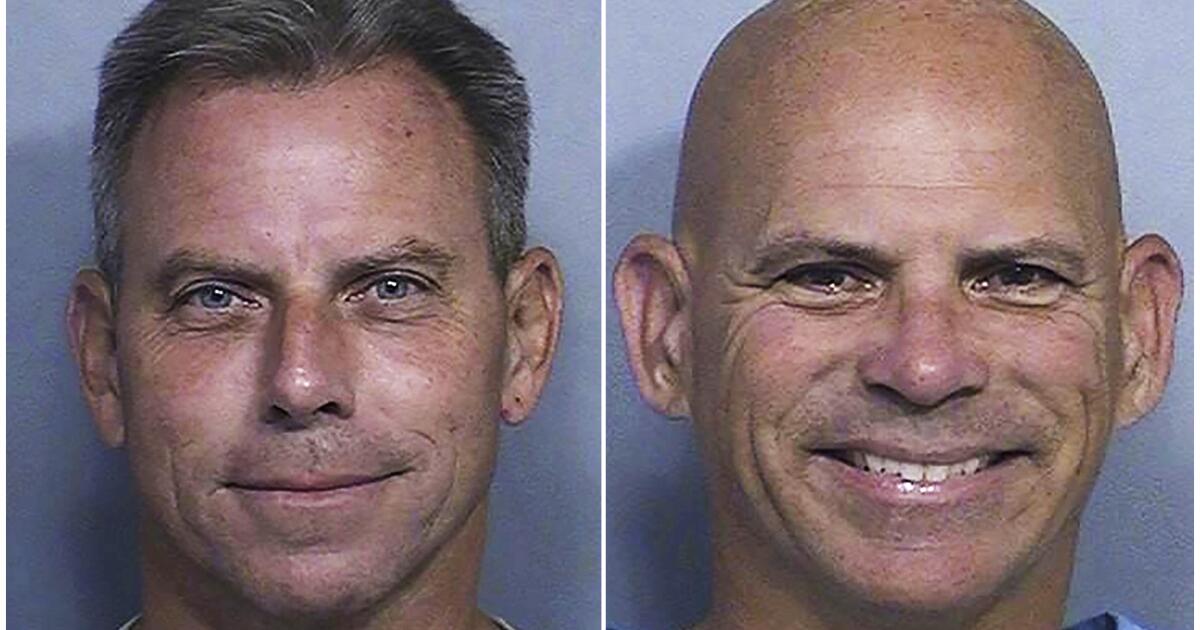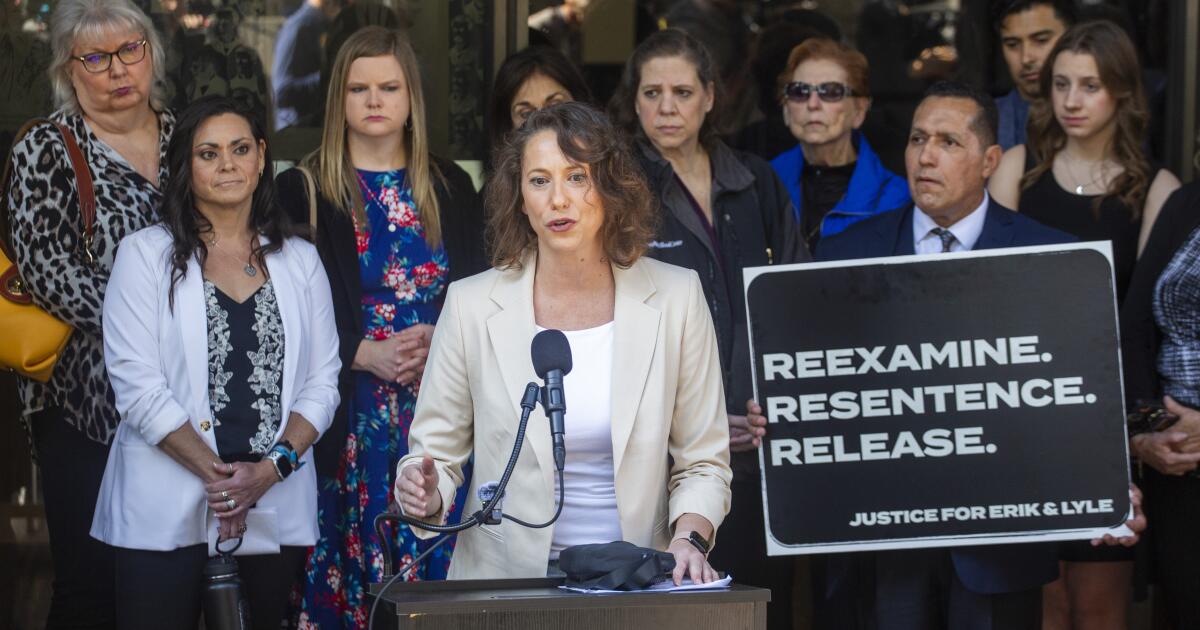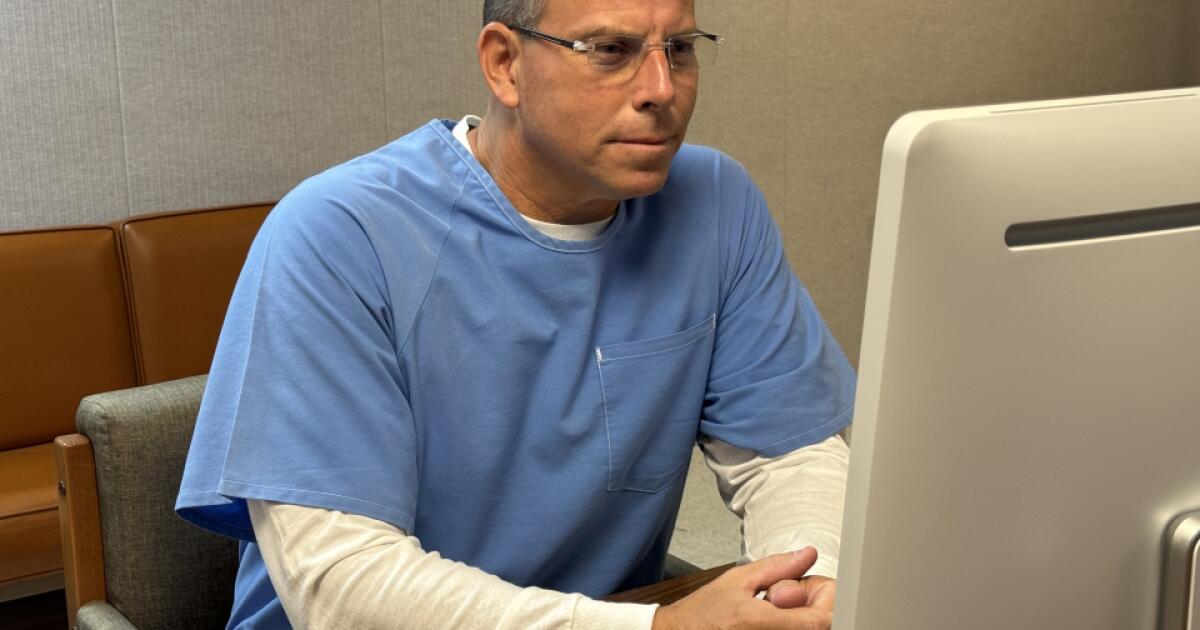SACRAMENTO — Erik Menendez will not be released, the California Parole board decided in a highly-anticipated and lengthy hearing Thursday, curtailing for now the contentious push by he and his older sibling to be freed after the 1989 killing of their parents in their Beverly Hills home.
The hearing came after years of legal efforts by Menendez and his brother to be set free despite being convicted of life without the possibility of parole in 1995. Their jury trial, and accounts of an abusive upbringing in the upscale Beverly Hills home, inspired several documentaries and television series that drew renewed attention to their case and allegations of sexual abuse against their father.
The hearing — the first time Erik Menendez, 54, has faced the California Parole Board — offered a never-before seen glimpse into his life behind bars over more than three decades. A separate hearing for Lyle, 57, is set for Friday.
The hearing, Erik Menendez noted, was 36 years and a day after his family realized his parents were dead. The killing occurred on Aug. 20, 1989.
“Today is the day all of my victims learned my parents were dead,” he said. “So today is the anniversary of their trauma journey.”
After a nearly 10-hour hearing, the board decided to deny parole to Menendez for three years. He could petition for an earlier hearing.
“This is a tragic case,” said Robert Barton, parole commissioner, after issuing the decision. “I agree that not only two, but four people, were lost in this family.”
Relatives, friends, and advocates have described the Menendez brothers as “model inmates,” but during the hearing Thursday members of the Parole Board raised concerns about drug and alcohol use, fights with other inmates, instances in which Erik Menendez was found with a contraband cell phone, and allegations that he helped a prison gang in a tax fraud scam in 2013.
More than a dozen relatives testified in favor of release for Menendez, with many of them saying they had forgiven him and his brother for the killing. Although amazed by the famiy’s support, Barton said Menendez should not be released on parole.
“Two things can be true,” Barton said. “they can love and forgive you and you can still be found unsuitable for parole.”
In a statement, a spokesperson for relatives of the two siblings said they were disappointed.
“Our belief in Erik remains unwavering and we know he will take the Board’s recommendation in stride,” the family said in a statement. “His remorse, growth, and the positive impact he’s had on others speak for themselves. We will continue to stand by him and hold to the hope he is able to return home soon.”
They said they remained “cautiously optimistic” for Lyle Menendez, whose hearing was set for Friday.
Menendez testified he obtained cell phones despite risking discipline because he didn’t believe there was a chance of him ever being released. He took the gamble, he said, because the “connection with the outside world was far greater than the consequences of me getting caught with the phone.”
He also associated with a gang, he said, for protection.
That all changed in 2024, he said, when he realized there was a chance be paroled at some point.
“In November of 2024, now the consequences mattered,” he told the board. “Now the consequences meant I was destroying my life.”
The crime that put Menendez and his brother in prison began when the siblings drove to San Diego, bought shotguns with cash using someone else’s identification, then returned home and opened fire in the family living room while their parents were watching television.
Investigators have said the gruesome crime scene looked like the site of a gangland execution. Jose Menendez was shot five times, including once in the back of the head, and evidence showed Kitty Menendez crawled on the floor, wounded, before the brothers reloaded and fired a final, fatal blast.
The brothers called 911, with Lyle screaming that “someone killed my parents,” according to court records. But while they appeared as grieving orphans, Erik and Lyle also began spending large sums of money in the months following the killings. Lyle bought a Porsche and a restaurant while Erik purchased a Jeep and retained a private tennis instructor with the intentions of turning pro. The two were infamously seen sitting courtside at an NBA game between the murders and their capture.
Prosecutors argued the brothers killed their parents out of greed to get access to their multi-million dollar inheritance. Jose was planning to disinherit the brothers since he considered them failures, according to court filings. The brutality of the crimes and the juxtaposition of such violence against the family’s Beverly Hills image turned the case into an international media circus, only rivaled at the time by the O.J. Simpson trial.
While mobs of reporters also circled the brothers resentencing hearings in Van Nuys earlier this year, Thursday’s parole hearing was a much more solemn and quiet affair. With the state Department of Corrections and Rehabilitation tightly controlling media access, a Times journalist was the only member of the public allowed to view the hearing on a projector screen in a room inside the agency’s headquarters just outside Sacramento.
The parole hearing is not meant to re-litigate details of the case or the brothers’ roles in the killings, but members of the board questioned Menendez Thursday on details of the grisly murders, which the brothers and supporters in their family were committed because they had suffered sexual abuse at the hands of their father.
“In my mind, leaving meant death,” Menendez told the board Thursday when asked why he didn’t leave the house, or go to police. “My absolute belief that I could not get away. Maybe it sounds completely irrational and unreasonable today.”
Menendez said he and his brother purchased the shotguns because they believed their parents might try to kill them, or that his father would go to his room to rape him.
“That was going to happen,” he said. “One way or another. If he was alive, that was going to happen.”
Asked why the two killed their mother as well, Erik Menendez said the decision was made after learning she was aware of the abuse, and the siblings saw no daylight between the two.
“Step by step, my mom had shown she was united with my dad,” he said at the hearing. “On that night I saw them as one person. Had she not been in the room, maybe it would have been different.”
He said the moment he found out his mother was aware of the alleged abuse was “devastating.”
“When mom told me…that she had known all of those years. It was the most devastating moment in my entire life,” he said. “It changed everything for me. I had been protecting her by not telling her.”
Asked if he believed his mother was also a victim to his father’s abuse, Erik Menendez said, “definitely.”
“He was beating her because I failed,” he said.
After denying parole, Barton pointed to their decision to kill their mother, calling it a decision “devoid of human compassion.”
“The killing of your mother especially showed a lack of empathy and reason,” Barton said. “I can’t put myself in your place. I don’t know that I’ve ever had rage to that level, ever. But that is still concerning, especially since it seems she was also a victim herself of domestic violence.”
Menendez was visibly overcome with emotion when discussing details of the murder, although he did not appear to cry.
After the murders, Menendez said the spending sprees between he and his brother, including buying a Rolex, were an “incredibly callous act.”
“I was torn between hatred of myself over what I did and wishing that I could undo it and trying to live out my life, making teenager decisions,” he said.
Erik eventually confessed to the killings in discussions with a therapist, and L.A. County sheriff’s deputies found a letter in Lyle’s jail cell admitting to the murders. After jurors hung in their first trial, Erik and Lyle Menendez were convicted of first-degree murder in 1996.
L.A. County Deputy Dist. Atty. Habib Balian opposed parole for Menendez during the hearing, arguing he lied to the parole board and had minimized his role in the killings during the hearing.
“When one continues to diminish their responsibility for a crime and continues to make the same false excuses that they’ve made for 30-plus years, one is still that same dangerous person that they were when they shotgunned their parents,” Balian said Thursday. “Is he truly reformed, or is he just saying what wants to be heard?”
Menendez, Balian argued to the board, was still a risk to society and should not be released.
Interest in the brothers case was revived in recent years following a popular Netflix series, “Monsters: The Lyle and Erik Menendez Story.” The popular show aired after a Peacock docuseries, “Menendez + Menudo: Boys Betrayed,” uncovered additional evidence of Jose Menendez’s alleged sexual abuse of his children and others, including Roy Rosselló, a member of the boy band Menudo.
The new evidence was part of the brothers’ most recent legal appeal in the case. More than 20 of the brothers’ relatives formed a coalition pushing for their freedom, arguing they had spent enough time imprisoned for a pair of killings that were motivated by years of horrific abuse.
Last year, Los Angeles County Dist. Atty. George Gascón petitioned a judge to re-sentence Erik and Lyle to 50-years-to-life in prison, making them eligible for parole. After he defeated Gascón in the November 2024 election, new Dist. Atty. Nathan Hochman quickly moved to oppose the re-sentencing petition, going as far as to transfer the prosecutors who authored it and asking a judge to disregard Gascón’s filing.
L.A. County Superior Court Judge Michael Jesic denied that request. After finding prosecutors failed to prove the brothers were a danger to the public, Jesic granted the resentencing petition in May, clearing the path for Thursday’s parole hearing.
Fellow inmates and rehabilitation officials have described the two as “mentors,” spearheading programs and projects for inmates.
The two have created programs to deal with anger management, meditation, assisting inmates in hospice care and to improve conditions inside prison.
Lyle spearheaded a Rehabilitation Through Beautification project at Richard J. Donovan prison, to work on upgrades and create green space in the prison, along with painting a 1,000-foot mural. Erik has worked with other inmates to do the artwork for the project.
But members of the board questioned Menendez on various incidents, including a fight in 1997.
Menendez said another inmate hit him first, but admitted that he “acted aggressively” as well. In another fight, Menendez said he “fought back” in self-defense.
Members of the board also questioned Menendez on multiple incidents that he was found with contraband, including art supplies, candles, spray cans, and cell phones that Menendez said he would pay about $1,000 to obtain.
Some of the art supplies he used to decorate his cell, he said.
Menendez said he also gave other inmates access to the phone, because “if it was someone that I trusted or someone that I knew had a phone I didn’t want to tell him no.”
He said he used the phones to speak wiht his wife, watch YouTube videos and pornography.
“I really became addicted to the phones,” he said.
During the hearing, Barton said he was concerned about the number of support letters that refer to Menendez as a model inmate, saying it could minimize the impact of cell phones in the prison.
Menendez said it wasn’t until later that he realized the larger impact that cell phones could have, despite how prevalent they could be in prison.
“I knew of 50, 60 people that had phones,” he said. “I just justified it by saying if I don’t buy it someone else is going to buy it. The phones were going to be sold, and I longed for that connection.”
But in January, he said, he had an in-depth with a lieutenant and took a criminal thinking class that made him reassess.
“The damage of using a phone is as corrosive to a prison environment as drugs are,” he said. “In the sense that someone must bring them in, they must be paid for, it corrupts staff…phones can be used to elicit more criminal activity.”
Members of the board spent a significant amount of time questioning Menendez on the use of contraband phones, and also pointed to them as part of their reasoning in denying parole.
“Your institutional misconduct showed a lack of self awareness,” Barton said. “You’ve got a great support network. But you didn’t go to them before you committed these murders. And you didn’t go to them, before you used the cell phone.”
Dmitry Gorin, a former prosecutor, said Menendez decision to break the rules while in prison affected his chances at winning release, even though he was young when he was convicted.
“If you’re not going to comply with the rules in prison, you’re not going to comply out in society — that’s what they’re saying here,” Gorin said. “The big picture here is without serious medical issues or being elderly, I don’t know anyone who killed two people who has been paroled.”
Nancy Tetreault, an attorney for former Charles Manson follower Leslie Van Houten, said despite public support for parole, Erik was considered moderate risk in the comprehensive risk assessment. To have a better chance at release, he would have to be considered low risk, she said.
“That’s very hard to overcome,” she said.
The two brothers were also involved in classes, but also would need to be more involved in rehabilitative programs for a favorable decision, Tereault said.
“Yes, they have a lot of classes and things like that that I was reading the classes they’ve put together, like meditation, for insight, that they’re leaving it, but they need to, they need to start programming,” she said.
Menendez admitted to drinking alcohol and briefly using heroin at one point in prison, which he said he tried because he was “miserable” and feeling hopeless.
“If I could numb my sadness with alcohol, I was going to do it,” he said. “I was looking to ease that sadness within me.”
Members of the board also asked Menendez about his connection to a prison gang and a tax fraud scam in 2013, but did not discuss details of the scheme.
Menendez said part of the reason he associated with members of the gang, known as 25s or Dos Cinco, was fear of his safety.
“When the 25ers came and asked for help, I thought this was a great opportunity to align myself with them and to survive,” Erik Menendez said, adding that he thought he needed to keep himself safe since he had no hopes of being paroled at the time. “I was in tremendous fear.”
The gang was in charge of the prison yard, he said, and a member approached him about the scheme, although Menendez said he did not personally control the checks. The gang also supplied him with marijuana, he siad.
Much changed after 2013, Erik Menendez said, and he curbed his use of drugs and alcohol. At one point, members of the gang also believed he had become an informant.
“I did not like who I was in 2013,” Erik Menendez said. “From 2013 on I was living for a different purpose. My purpose in life was to be a good person.”
In Oct. 14, 2023, his mother’s birthday, he said he committed to stop using drugs, he told the board.
Deputy Parole Commissioner Rachel Stern asked Menendez about his work with hospice inmates, including a World War II veteran convicted of an unspecified sexual violence crime that Menendez helped with getting his meals and bedding.
Menendez said he saw his work with the inmate as a way to make amends for his father.
Menendez apologized to his family during the hearing, noting their support.
“I just want my family to understand that I am so unimaginably sorry for what I have put them through,” he said. “I know they have been here for me and they’re here for me today, but I want them to know that this should be about them. It’s about them and if I ever get the chance at freedom I want the healing to be about them.





